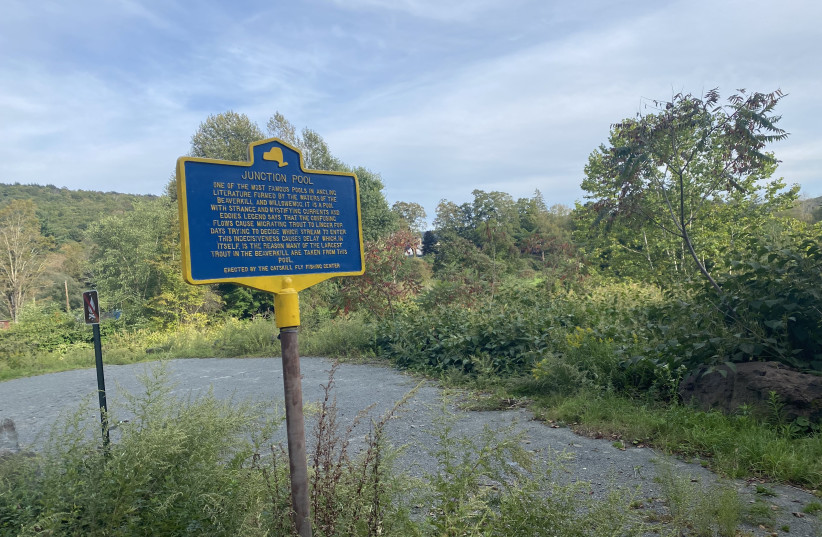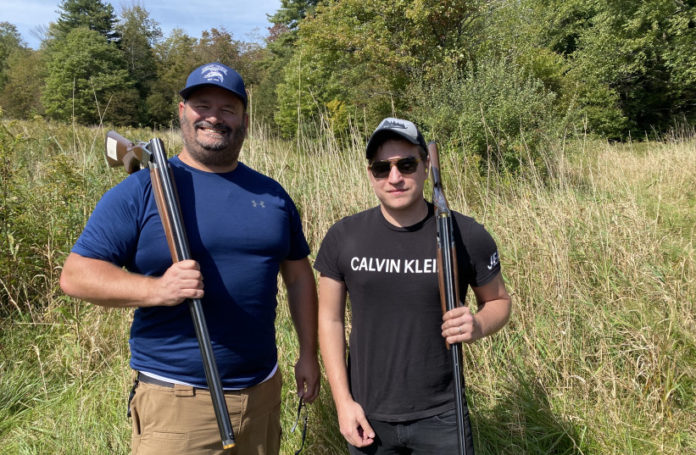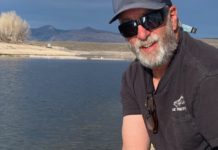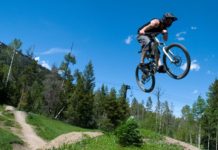Traveling these days has become arduous.
It’s all about the timing. Several months before a flight you have to actually book the flight. But you don’t know what will happen during those months. Maybe there will be a new pandemic we didn’t know about, part of the already existing pandemic we have to live in.
The media sources fill our head with stories of dread – what new evils may come from this existing plague, underscored by headlines about various new bureaucratic hurdles for the most basic things.
cnxps.cmd.push(function () { cnxps({ playerId: ’36af7c51-0caf-4741-9824-2c941fc6c17b’ }).render(‘4c4d856e0e6f4e3d808bbc1715e132f6’); });
if(window.location.pathname.indexOf(“656089”) != -1){document.getElementsByClassName(“divConnatix”)[0].style.display =”none”;}else if(window.location.pathname.indexOf(“/israel-news/”) != -1){ document.getElementsByClassName(“divConnatix”)[0].style.display =”none”; var script = document.createElement(‘script’); script.src=”https://player.anyclip.com/anyclip-widget/lre-widget/prod/v1/src/lre.js”; script.setAttribute(‘pubname’,’jpostcom’); script.setAttribute(‘widgetname’,’0011r00001lcD1i_12258′); document.getElementsByClassName(‘divAnyClip’)[0].appendChild(script);}else if(window.location.pathname.indexOf(“/health-and-wellness/”) != -1){ document.getElementsByClassName(“divConnatix”)[0].style.display =”none”; var script = document.createElement(‘script’); script.src=”https://player.anyclip.com/anyclip-widget/lre-widget/prod/v1/src/lre.js”; script.setAttribute(‘pubname’,’jpostcom’); script.setAttribute(‘widgetname’,’0011r00001lcD1i_12246′); document.getElementsByClassName(‘divAnyClip’)[0].appendChild(script);}
Air travel wasn’t particularly pleasant before this whole experience. The ever-decreasing sizes of seats and legroom made travel feel more like navigating in human sardine cans than the luxurious air travel we are told once existed in the 1960s. As if to remind us, the airlines still tell us not to smoke. When was the last time people smoked on an airline? Not in most people’s living memory. When was the last time there was a pandemic? Also not in living memory.
It was into that maelstrom I went, once again like in Henry V “once more into the breach,” with the COVID test a few days before flying, hoping to be negative, and then wondering about the aisle seat I’d chosen on my United Boeing 787-10 Dreamliner, which ferries people from Tel Aviv to Newark every day. It’s a good flight in general because it leaves late at night and gets you in at 4 a.m. local time. Not much is open at that hour, but you can find a Dunkin’ Donuts at the airport, which is a good way to begin the “return” to America that one experiences when arriving.
I was going to the United States for only the second time since the pandemic. I had decided to make this a trip to see family, rather than my usual routine before the plague which would have involved business and scheduled talks and meetings. No family could come with me because one of the added evils of the pandemic is that children would face quarantine upon return. Adults returning to Israel with their two vaccinations and booster shot from Pfizer don’t face the quarantine. So the adult is privileged. The children less so.
FROM NEWARK I took a flight to Maine to attend my father’s wedding. Maine’s Portland airport is relatively small and easy to navigate. I’d decided to rent a car, one of several car rentals over the next two weeks, to get a chance to cover some ground and explore.
What was immediately noticeable is that being away from the centers of US media and politics is a welcome breather from the lurid stories of the pandemic. The plague has taken its toll, of course. Along the sidewalks and other areas are detritus of the conflict, the markers showing social distancing, where to stand; the signs requesting people to wear masks in stores. But for the most part the pace of life is as I remember it before the pandemic. People are friendly and helpful. Life goes on.
Freeport, Maine, is known for being a center of shopping, a kind of small town festooned with brand-name stores, like Patagonia, Old Navy and Starbucks. It’s simultaneously quaint and bourgeoise. L.L. Bean, famous for its outdoor clothing and accessories, seems to offer everything you’d need for several lifetimes of exploring. Kayaks, guns, bow hunting equipment, fishing rods, tents. You could outfit yourself for almost any enjoyable sport that you might wish to take up.
THE OPEN road near Portland, Maine, with a jet trail overhead. (credit: SETH J. FRANTZMAN)
For me it was fishing. I hadn’t gone fishing since I was a kid but felt that now was the time to give it a try again. Needless to say, since I know nothing about fishing the choices were a bit daunting, and expensive. The rods and reels all conjure up something out of that film A River Runs through It.
When I was a kid growing up in Maine we ran a sporting camp called Little Lyford Pond Lodge, which is not far from Greenville in the north Maine woods. This is a beautiful area that is also vast, comprising several million acres of land that sits astride mountains, streams and lakes. I remember fishing from those ponds with men who would tie their own flies for fly fishing. That easygoing life of spending time camping and staying at cabins and fly fishing in the summer seems worlds away not only from Freeport and Newark, but from the Boeing I’d flown in on, or the Dunkin’ Donuts greeting us that morning. But it was the feel of that life I was seeking to return with, in two weeks’ time, when I was supposed to fly back to Tel Aviv with fishing rods in tow.
I don’t know what life in the Soviet Union was like or all these various dictatorships I heard about as a kid, but it must be that they appreciated the privilege to travel the way we, conversely, took for granted. Now the world is reversed. For the Western democracies the basic privileges of life, like going to a store to buy bread and milk, are a welcome freedom from two years of chaos.
However, traveling outside the urban areas like Newark to rural ones is a window into a life that has gone on, at least in part, as it did before. It is no surprise, as I learned, that people are rushing to buy property and gain a foothold in places away from the fleshpots that appear like hellholes during the plague. I can only see anecdotal evidence on social media of venues in New York demanding proof of vaccination and more that makes one think, “Maybe a life far from these demands is better.” It’s not about the issue of being vaccinated, but wanting to be removed from always having to produce such proof in order to do normal activities. When the normal activity is going fishing or hiking, there is no minder there to ask for proof of anything.
I journeyed from Maine, then by bus to Massachusetts (Cape Cod and Martha’s Vineyard), then West through Rhode Island, Connecticut, New York and New Jersey. Along the way I got to see places that were only sites on a map in the past. In Plymouth, Massachusetts, a tourist site I never would have wasted time on during a previous era, I went to see Plymouth Rock.
It is here that William Bradford and the Mayflower Pilgrims founded their Plymouth Colony in 1620. It’s not really much of a rock, to be honest. One might have missed it at the time, but for the fact we are told it matters. Plymouth appears to be a natural harbor, so it’s no wonder these folk found safety here. The name of the place can be spelled Plimoth, which is how it sounds. With time the obvious spelling gave way to the more obnoxious one.
Anyway, Plymouth is a nice town on the sea and has a replica of an old ship and a museum devoted to the period of the 17th century when this area was colonized and settled. Traveling west from here toward New York is a way to kind of retrace the steps of the spread of settlement to North America in that era. Hartford, Connecticut, was founded in 1635, and I’d decided to stay in West Hartford to see some cousins.
Despite having family spread up and down the east coast from Washington to New York, Providence to Cape Cod and Maine, I’d never taken time when I was younger to enjoy this area. I was always in too much of a hurry. Once in 1998 I drove from Arizona to Maine in three days, never bothering to see any of this. In 1997 I lived on Martha’s Vineyard, working the summer in an ice cream place. I also worked in Maine in 1998, and took a drunken jaunt down to Boston the next year, but never appreciated any of these towns as I do now at a much more advanced age. It’s the pandemic that provided a new lens to see all this. To finally drive up the Hudson River and see it in its grandeur, to go up to the Catskills to go pheasant hunting.
WHAT IS striking from a road trip in the era of the pandemic is how normal most things are. It’s true that this is not the real “normal.” There is hand sanitizer everywhere and here and there are masks and signs asking people to wear them. Every establishment seems to have its own rules. Some require masks, others suggest them, and in New Jersey I found signs suggesting them only for the unvaccinated. But there were no heavies at the door to check, so it all seemed to be still partly by choice. It’s not clear what next week will be like, perhaps next week will bring some new regulation. Yet overall, it was a pleasant surprise to see things relatively flexible.

Whenever one moved off the beaten path, such as up in the Catskill Mountains or rural Maine, the pandemic could be almost totally forgotten. That is because there is more than one pandemic. There is a very real health crisis that involves a COVID virus that began in China and has swept the world. There is another pandemic that is the pandemic of the mind. That is the pandemic that comes with reading daily doses of media stories about anger over the “unvaccinated” and healthcare systems collapsing and angry people saying angry things about other angry things.
But it isn’t the reality. It’s a pandemic of social media anger and media stories about people shouting and fighting on planes. In my weeks traveling on the road across the parts of the northeastern US, I didn’t hear one person ask another to put their mask on correctly, or shout about the “unvaccinated.” We are told that these things happen, in restaurants and in line, in congested areas. But I didn’t see it at Boston’s South Station, nor in the airport, nor on buses, planes, trains or automobiles. That might lead us to wonder whether, outside the centers of power, if we just set foot off the main road to the road less traveled, if we can escape the pandemic’s tidal-like pull.
I tried to avoid discussing it as much as I could. Of course that’s not always possible, but one gets the sense that as we approach the two-year mark, what we might call Year 2, if 2019 was Year Zero, that people are tiring of this crisis. They want either a return to the old normal or a new normal that at least is flexible and pleasant.
They will put on masks when they need to, such as on public transport, but for the most part they don’t want this life of masks. They will get vaccinated, but they don’t want to be asked for vaccine documents, like travel documents in the Soviet Union, all the time. They have opted out of the angry media tales spread by legacy newspapers telling them to blame their troubles on mythical legions of “unvaccinated” that are “overrunning hospitals,” because they likely know that this zombie-like story is largely a myth.
Because they get up every day and get a Starbucks coffee, or swing by Dick’s Sporting Goods, and things are mostly normal. Even things that were scarce for a while, like shells for the large numbers of firearms people stocked up on during the pandemic, are no longer scarce. You can get your rifle, shotgun and pistol ammo again.
After all, it’s America, and even in Yankee country people like their firearms.
Credit: Source link































